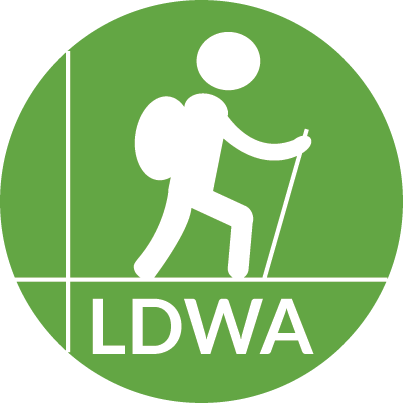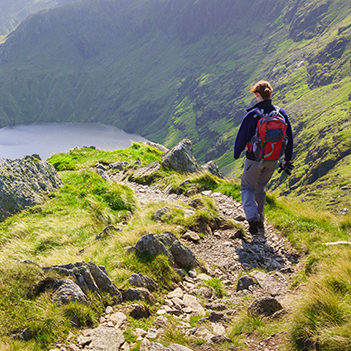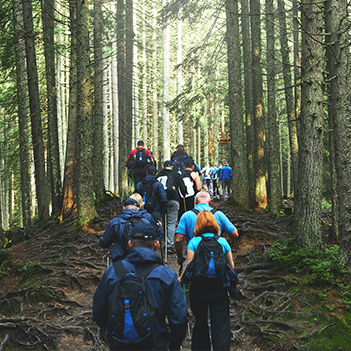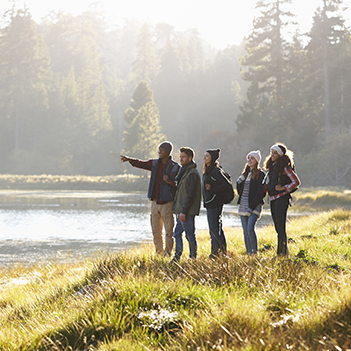Information and Rules of the Speyside 100 Marshals' Event
Click here to access Speyside 100 Marshals' Event rules in PDF format
1. The Event:
The aim is to complete, on foot, a defined route of at least 100 miles within a maximum elapsed time of 48 hours.
1.1 Entrants should start at 10am on Saturday 4th May 2024. A later start may be available on request. Anyone arriving at a checkpoint before it is open will have to wait. All entrants must finish by 10am on Monday 6th May 2024.
1.2 The Event is restricted to LDWA Members ONLY who are providing substantial support for the Main Event which has been agreed in advance. Offers of support should be agreed with the organisers.
2. Start and Finish:
2.1 Start and Finish are at Boat of Garten Community Hall, Reidhaven Park, Craigie Avenue, Boat Of Garten, PH24 3BL Grid Reference: NH936188.
2.2 There is ample space for parking cars at Reidhaven Park and they may be left there over the weekend. Cars and camper vans are allowed to park at Reidhaven Park, and participants (only) are allowed to sleep in them.
3 How to enter:
3.1 Entries for the Speyside Marshals 100 opens on 31st October 2023 and closes on Sunday 31st March 2024. Early entry is encouraged to assist in planning of the Main event.
3.2 The only method of entry is via postal application. Send the completed form (on the 'How to Enter' page) to Madeleine Watson, 65 Old Park Road, Roundhay, LS8 1JB, along with a payment via BACS (details on form).
3.3 Entries will be acknowledged via email unless an SAE is provided.
4 Conditions of Entry:
All entrants must:
4.1 Be aged 18 years or over on the 4th May 2024.
4.2 Provide evidence of having completed an event from the list of qualifiers shown on the event website of at least 50 miles, or completion of 50 miles of an event of longer than 50 miles on the list of qualifiers, after 1st January 2023. No other qualifying events will be accepted. Entries will only be accepted when evidence is produced that a qualifying event has already been completed. Conditional entry on the basis that a qualifying event will be completed in the future will not suffice.
4.3 Have paid the required entry fee in full and be a current member on the date of application and on the date of the event.
4.4 Agree to comply with ALL of the event rules and with following disclaimer - “I agree to the Rules of the Event and participate in the Speyside 100 event at my own risk. I understand that I am responsible for ensuring that I have undertaken the necessary preparation and training to participate in the event, that I am sufficiently fit and healthy to participate and that I will comply with all relevant UK Government and local COVID laws and guidelines should any exist. I understand that if I have a medical condition that would cause me to doubt whether I can participate in the event, then I will not do so unless I have sought reassurance from the medical profession. I will abide by the Scottish Outdoor Access Code (Scottish equivalent of the Countryside Code) and understand that the Long Distance Walkers Association will not be held responsible or liable for any loss, damage, action, cost, expense, claim, injury, illness and in worst case scenario, death suffered as a result of my participation. On entering the event, I assume full and complete responsibility for any injury, accident, costs, expenses, damages, losses and any other liabilities which may occur while I am travelling to and from the event and during the event, although the LDWA does have some limited accident compensation cover for its members – please look in the Toolkit for details.”
5 Cost:
5.1 The entry fee is £120 for LDWA Individual and Family Members (membership must be current at the time of entry and also on the date of the event). The reduced entry fee for LDWA volunteers helping on the Main Event is £70 provided that their specific roles in the Main Event are pre-approved by the event organisers.
5.2 Payment will be made via BACS, details on the entry form. The refund of £50 will be made by cheque which will be available for collection on the Main Event.
5.3 The entry fee includes all refreshments provided during the event including a meal at the breakfast checkpoint, baggage transport to/from the breakfast checkpoint, transport for retirees, a meal at the finish, a certificate for all starters and a badge for all finishers. Transport of entrant’s own food to checkpoints for those with special dietary requirements is included in the cost provided the food is supplied and labelled with their name, walk number and checkpoint number to be delivered to, and the organisers are notified in advance. The event report and results will be published on the event website soon after the event.
6 Ballot:
There will be no ballot in relation to Marshals' Event entries.
7 Cancellation and Withdrawal:
7.1 If the event is cancelled (at any point in the planning and delivery period) for any reason the organisers will do their best to contact entrants using the details provided on SiEntries. Entrants are reminded to add their mobile phone contact details as part of SiEntries process. The Organisers will put a notice on the event website and main LDWA website as a NEWSFLASH and entrants are strongly recommended to check this before departure. Cancellation of the event will be at the discretion of the organisers and entry fees will be refunded less a proportional amount for unavoidable costs incurred.
7.2 If an entrant withdraws his/her entry on or before 31st March 2024 the Organisers will refund the fee, less £20 for administration. There will be no refund if an entrant withdraws after 31st March 2024.
8 Route:
8.1 Entrants must follow Cairngorm National Park policies whilst going through their areas. See https://cairngorms.co.uk/ for details.
8.2 Entrants must follow the Scottish Outdoor Access Code (Scottish equivalent of the Countryside Code) at all times. See https://www.outdooraccess-scotland.scot/ for details.
9 Kit Required:
This year it is recommended that entrants walk in full length leg covering because of the risk of tick bites. The mandatory items below are a minimum – you should wear and/or carry sufficient clothing to be confident of staying warm and dry regardless of the weather. Each participant must carry ALL items for the duration of the event unless otherwise mentioned below. Sharing of items is not permitted. There will be a kit check at some point during the event, and any participant not carrying required item(s) of kit will be immediately disqualified and transported to the finish by official transport. The organisers also reserve the right to carry out subsequent kit check(s) at any time if they so wish and likewise failure to provide item(s) requested will result in immediate disqualification and transport to finish. — See Section 13
9.1 The mandatory kit that is required for your safety is:
- Route Description for the entire route from the start*. This must be the official route description of the event and can be in: Paper form and kept waterproof OR Can include an electronic version provided durability and adequate power supply for 48 hours can be demonstrated if requested by a marshal.
- Maps for the entire route from the start* as specified in 10 below.
- Tracker as supplied at registration on the day which should be kept switched on until you return to HQ.
- Tally card as supplied at registration on the day. You are responsible for ensuring it is punched at every checkpoint.
- Upper body clothing – you must wear or carry through the event three layers
- A base layer (eg a t shirt or other shirt)
- a long sleeved warm layer (eg a thermal or fleece) and
- a waterproof layer (jacket) which has an integral hood
- Lower body covering – you must wear or carry throughout the event two full length layers
- A warm layer (eg walking trousers or full length leggings) and
- a waterproof layer of full length – waterproof overtrousers OR
- waterproof trousers which consist of two layers, a waterproof shell and a lining
- shorts would therefore be an additional layer at your discretion.
- Hat (and not a Buff/Bandana/Hoodie Sweat shirt or similar) and Gloves.
- Compass graduated with degrees on the dial. This can include an electronic device provided adequate power for 48 hours can be demonstrated if requested by a marshal.
- A working whistle.
- A working torch with spare batteries sufficient for 2 nights and spare bulb if not an LED device.
- A survival bag (not a space blanket).
- First Aid kit, which at a minimum must include plasters, adhesive dressing, antiseptic wipes, fixation tape and low adherent dressing. (please see note in 9.2 below)
- Emergency food.
- A resealable drinks container, minimum size 0.5 litre.
- Reflective clothing or reflective markers on backpacks. These must be visible when walking at night.
Note that for the above items marked * (RD and Mapping), it is acceptable for items to be discarded at checkpoints or in breakfast bag relating to the part of the route which has already been completed.
9.2 Other kit that we recommend you carry, but for which you will not be disqualified if you are not carrying it is as follows:
- Tick remover
- Midge net (NB not a mosquito net)
- Midge repellent
- A cup or mug (none will be provided on route).
- Money/Debit/Credit card and/or fully charged (and switched on) mobile phone for emergency use.
- Any personal medication which you may need during the event (any prescription medicines for the duration of the event, and items such as pain killers, anti-histamine, anti-motility and anti-emetic). Marshals and first aid team will not be able to provide these for you.
10 Maps Required:
10.1 1:25,000 Explorer 424, OL57, OL61 and OL62 (or the equivalent printed out versions from your mapping software provided that there is at least 1km border around the route) or,
10.2 OS 1:25,000 maps in downloaded electronic format will also be allowed provided durability and adequate power supply for48 hours can be demonstrated if requested by a marshal.
11 Baggage:
11.1 A single small bag containing non-essential items, marked with the entrant’s walk number should be deposited in the area provided at the start, and will be transported to the breakfast stop. It will then be taken back to HQ for collection at the finish.
11.2 A numbered tag will be supplied which should be secured to the breakfast stop baggage.
11.3 Entrants undertake not to leave cash or valuables (e.g., mobiles/GPS) in it. The organisers will accept no responsibility for any losses or damage.
11.4 Entrants MUST keep the size and weight of the small breakfast bag within a maximum permitted size of 50 cm x 30 cm x 30 cm and maximum weight 6 kg (13lb).
11.5 Bags may be weighed and measured and bags exceeding the size or weight specified above will NOT be transported. No plastic sacks or bin liners will be accepted, nor items other than those wholly contained within the bag. This includes walking poles.
11.6 One additional Bag of reasonable weight and size may also be left at the HQ for the duration of the event. A label with the entrant’s number will be provided. Any excessively large and or heavy bag will not be handled.
11.7 All bags must be collected by 11.00am on Monday 6th May 2024.
12 Conduct of the Event:
The LDWA recognises that it has a duty of care towards those participating in the 100 mile event and this is outlined in Section A below. However, participants must appreciate they have also have a duty to conduct themselves in a reasonable fashion and to obey the Rules of the Event. These duties are outlined in Section B below. Ultimately individuals must take responsibility for their own actions.
Section A. Organisers’ Duty Of Care:
A1 The Event Organisers will undertake a suitable and sufficient risk assessment for the Event and keep it updated. They will also liaise with all relevant statutory authorities and landowners and obtain all relevant permissions. The arrangements provided by the organisers in furtherance of its duty of care will include:
A2 The organisers will ensure the distance is as close to 100 miles as practicable and physically possible and the route description is as accurate as possible.
A3 The organisers will marshal any potential points on the route where the organiser and the local Safety Advisory Groups consider there to be risks. They will sign those risks as well as other places of potential risk that the organiser identifies. Furthermore, the organiser, having identified possible risks, will seek to mitigate them in a way that is appropriate, proportionate and reasonable, whilst recognising that not all risks can be totally mitigated.
A4 The organisers will have checkpoints under cover and inside halls as much as is reasonably practicable.
A5 The organisers will ensure there is sufficient quantity of high-quality nutritious food.
A6 The organisers will implement a robust communications system consistent with the terrain and known difficulties of communication.
A7 The organisers will provide transport for entrants who retire in order to return them to Walk HQ.
A8 The organisers will provide First Aid at Walk HQ and at Breakfast (although entrants should be self sufficient as in B1 below).
A9 The organisers will provide provision for entrants to sleep at Walk HQ at the end of the event. However, entrants expecting to finish close to the 48 hours completion time should consider making alternative post event arrangements as event HQ may need to be vacated soon after official finish.
A10 The organisers will provide entrants with an emergency telephone number.
A11 The organisers will identify which checkpoints entrants’ supporters are welcome to visit and which they are not. The organisers will identify the reasons why supporters are not welcome at certain checkpoints. This information will be provided on the event website.
Section B: Entrants’ Duty of Care:
B1 Entrants have a personal responsibility for their own fitness and well-being and undertake to enter the event based on the fact that they have prepared appropriately. Additionally, all participants must carry the appropriate equipment for their own safety and protection.
B2 Two or more checkpoint marshals will have the authority to retire entrants who in their opinion are behind schedule or appear to be showing signs of distress going beyond normal fatigue. Entrants must obey directions given to them by marshals, and hand in their tally card and retire from the event if so directed by a marshal.
B3 Retiring entrants should hand in their tally card at a checkpoint and wait for transport to be arranged to HQ. In an emergency, if retiring entrants cannot reach a checkpoint, they should pass their tally to another person to hand in, or call the emergency telephone number. Under no circumstances should anyone retire from the event without ensuring the organisers are informed. The tracker should be left switched on until entrants are back at HQ.
B4 Entrants must not be threatening, abusive or insulting to a marshal, other entrants and members of the public and understand that if reported, their behaviour might be subject to formal review from the ‘LDWA 100 Review Group’.
B5 Entrants must follow the route description provided including any late changes notified at the start or on route by marshals, and get their time recorded at each checkpoint, including any self-clips.
B6 Entrants must pass through checkpoints in order. In the event that they deviate from the route they must get back on route by the shortest practical means without trespassing on private property. (Deliberate deviation from the route to gain advantage will result in disqualification.)
B7 Entrants must understand that they shall not be allowed in a checkpoint other than during the official opening times of the checkpoint. These times will be displayed on the event web site and in the route description. Entrants understand that checkpoint opening and closing times will be strictly enforced. Entrants will be aware of the times when choosing a starting time.
B8 Entrants must understand that if they arrive at a checkpoint after that checkpoint has closed then they will be retired. Under exceptional circumstances this may be waived at the discretion of the organisers.
B9 Entrants must understand that checkpoint marshals will retire any entrant remaining at a checkpoint for more than 2 hours.
B10 Entrants must complete the event exclusively on foot unless directed by a marshal to do otherwise.
B11 Entrants must comply with the Scottish Outdoor Access Code (Scottish equivalent of the Countryside Code) at all times and do nothing to bring the LDWA into disrepute.
B12 Entrants must be quiet at night, particularly near residential properties where noise could disturb.
B13 Entrants understand that the organisers reserve the right to vary the route for any reason such as adverse conditions or road closures, in which case entrants will be informed of the variations by marshals.
B14 Entrants understand that marshals shall be entitled to group entrants for reasons of safety, for example during adverse conditions.
B15 Entrants will be held accountable for the behaviour of their supporters in connection with the event, particularly at checkpoints and at Walk HQ. Entrants should therefore ensure that their supporters do not visit checkpoints that the organisers have identified are to be kept supporter free. Given the potential seriousness of any incident, those individuals behaving irresponsibly or even without due care and attention of their surroundings will be brought to the attention of the checkpoint manager who if involved will expect immediate cooperation and compliance with any reasonable request. If in the very unlikely case of anything not being resolved at once the incident will be reported to the ‘LDWA 100 Review Group’ with the possibility of subsequent sanctions for any LDWA member involved.
B16 No dogs are permitted on the event.
13 Disqualification
13.1 Entrants in breach of any of the rules of the event will be disqualified. They will be asked to surrender their tallies, and they will be transported back to the finish by official transport.
13.2 In all matters connected with the event the decision of the organisers is final. At checkpoints the decision of the marshals is final.
14 Reconnoitring the Event:
14.1 Accepted entrants who wish to reconnoitre the event should please note that the route may be subject to alteration which may include sections of private land or land that has restrictions on access.
14.2 Any person who is identified as trespassing on land where access has been negotiated for the duration of the event only may be subject to disqualification.
14.3 Any person who is identified as marking the route will be disqualified.
15 Privacy, Data Protection and Personal Information:
15.1 Entrants understand and agree that their personal information submitted as part of their entry will be held by the event organisers for a period of up to seven years after the event and is held for the purposes of managing this event only. Entrants further understand that photographs and videos are likely to be taken during the event, which may be featured in Strider magazine, group newsletters, on LDWA websites and on LDWA social media. Additionally, entrants understand that Summary Information* may be published immediately and may be held in perpetuity for the purposes of providing a record of the event. Entrants have the right to contact the organisers and request that all of their personal Summary Information* is anonymised. Any medical information will be held for duration of event only, including notification to the company providing medical cover, and will be erased after the event.
*Summary information is limited to the entrant’s name, age, gender, postal town, LDWA membership number, event name and date, distance covered, time recorded as well as any other linked walking achievement.
15.2 Entrants can choose to remain anonymous during any of the event live progress reporting. However, for operational and safety reasons the organisers will need to store entrants’ personal information on a computer. This is a pre-condition of entry and by entering the participant agrees to this temporary storage. This information will be held by the teams helping to plan and marshals managing the event, on a strictly need-to-know basis and will be erased after any report and results have been published.
15.3 Entrants should be aware that the LDWA maintains a Hundred Register (formerly the Hundred Database) held on the Association’s secure server. The Hundred Register contains membership number, full name, gender, local group, year of birth (where declared on entry forms), number of Official LDWA Hundreds started and finished, and years and times. It does NOT include addresses (postal or e-mail), telephone numbers, any declared medical conditions or any emergency contact names, addresses or telephone numbers. Entrants who do not want their details to be stored on the Hundred Register should be aware that this will result in their name and records being completely deleted. The onus will then be on these individuals to prove they are eligible, if applicable, for the 10/20/30/40 awards.
15.4 Taking part involves carrying a tracker throughout the event. A link to the tracking web site will be sent to all entrants and publicised on the LDWA web site, the event facebook page and the LDWA facebook page. Hence, it will be possible to follow the progress of named entrants throughout the event.





